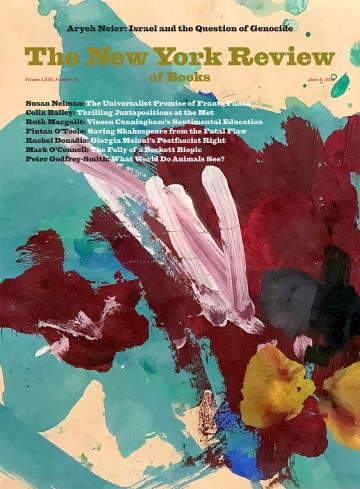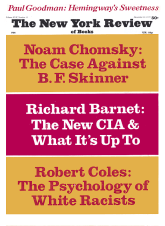The poems of David Ignatow are wry, they are about ordinary working life, and yet they are continually overlaid with a wisdom that is not so much from experience as from courage and intelligence. He might be called an urban Robert Frost, showing on the surface a simple soul, but beneath is always the finely honed blade of a witty, cynical, very perceptive and knowing man. I always hate to invoke the name of Frost in discussions of contemporary literature, since he is now so much out of vogue. But I will not cater to narrow minds on the subject of poetry.
Ignatow’s real mentor in tone and style is, of course, William Carlos Williams (whom it is fashionable to like, right now). He too glorifies the living fully of each mundane daily act. Celebrating the ordinary. And yet David Ignatow is not just a Williams disciple. His life, as an urban Jewish bankrupt businessman living through an economic depression, not having enough money to go to college, having a son confined to a mental institution for life, living around petty and stupid people, and having to moonlight at night on depressing jobs such as admissions attendant in a hospital, gives a kind of wicked desperation to the brevity, the wit of the poems. He seems to be saying: “By God, I’m going to stick out this miserable life and find something to love in it somehow.”
This desperation sometimes pushes the poet, without his realizing it, into an imaginative, almost surrealistic perception of the world (I think of poems like “How Come?” in which gigantic soap bubbles cover New York and then the whole country, “The Bagel,” “Last Night,” “News Report,” or “Versical Response”), but most often his poems are simple factual statements. What makes them memorable is their double-edged endings, almost always showing Ignatow’s attempt to declare to himself that life is bearable—life may be ironic but it isn’t so bad—while gently and sweetly showing how utterly unbearable it is.
No other poet I have read has so little self-pity, so much humility, and such an unbearable reality to deal with. His reality is precisely the one poets almost never experience or even think about. The nonintellectual petty bourgeois who must struggle from day to day in a world where his own values are measured by money yet never make enough of it himself. Intellectuals have a built-in resistance to the world of money. We can call it foolish, false, unreal—give us our books and papers and we survive. But Ignatow speaks of the world in which a man, if he cannot provide for his family very well, is not a man. He has no books, papers, rationalizations, or arguments to run to. He has only a world of mean bosses, petty customers, and a poor life. Many of Ignatow’s best poems are very short. Let me quote one here:
Self-Employed
I stand and listen, head bowed,
to my inner complaint.
Persons passing by think
I am searching for a lost coin.
You’re fired, I yell inside
after an especially bad episode.
I’m letting you go without notice
or terminal pay. You just lost
another chance to make good.
But then I watch myself standing at the exit,
depressed and about to leave,
and wave myself back in wearily,
for who else could I get in my place
to do the job in dark, airless conditions?
(from Rescue the Dead, 1968)
In another sad beautiful poem from Rescue the Dead, “Against the Evidence,” he says, “All my life / I’ve held books in my hands / like children / …. But no book will help either.”
Ignatow talks about a reality few poets perceive, the world where books will not help to mitigate the pain. Perhaps it is precisely that workingman’s view of the world (I do not wish to imply here that Ignatow’s writing is uneducated and without literary content, but simply that the surface of the poem is always that of the mild-mannered, neatly and inexpensively dressed workingman of the city) which may account for the fact that David Ignatow does not receive the attention he deserves from the literary establishment, is not given national prizes. That establishment, even the avant-garde, is filled with bookish people like myself who, even if they have had to live in the workaday world, almost never think about it, escape from it as fast as they can, and in some ways never “sully” their poetry with it.
How brave of David Ignatow to talk about these things and attempt to make poetry from them. Surely that is the object lesson of Williams’s own lifework, though he luxuriously had a more interesting and rewarding life to choose from. When Williams eats the delicious icy plums in his refrigerator he can transform the note he leaves to his wife into a metaphysical love poem. Ignatow’s icebox is more likely to have rotten apples in it. Read this: is it irony, is it sweet selflessness, is it an acceptance of reality?
Advertisement
To An Apple
You were rotten
and I sliced you into pieces
looking for a wholesome part,
then threw you into the street.
You were eaten by a horse,
dipping his head to nibble
gently at the skin.
I heard later he became violently ill,
died and was shipped off
to be processed. I think about it
and write of the good in you.
(from Figures of the Human, 1964)
I would not like to give the impression that there is either passivity or stolidity in this work, though perhaps the surfaces I’ve talked about belie that a bit. I feel that these simple endings are the complex result of a sensitive, brutalized, battered but determined-to-survive human being. They are understatement of the highest order and show a beauty and goodness that simply won’t be beaten down. How marvelous to find a man so beaten down coming up again neither ruthless nor flaccid. Always seeing what goes on underneath a person, a situation, and still being able to behave with some coolness and belief.
Side By Side
What does it mean to be mature?
We have got to take hold of the fellow
we work with and whom we trust to be true
to us in a crisis and say to him,
gripping him by the shirt front
near the throat, our face thrust into his:
snarl at him “Now look here, I see clear
through you, playing me for a sucker
by being nice to me. You want to get away
with something without paying for it.
I am not going to let you, see?
I am not going to be taken advantage of,
and when I get the chance to do what I want
I shall do it with much more ruthlessness
than you and not be tied up in feelings.
After that I shall be friends with you,
once I have what I want from you.”
This being maturity, I turn to him
as we sit side by side working
and say aloud so that it may be heard
all over, “Give me a cigarette, will you,
I’m all out of them.”
(from Say Pardon, 1961)
I will always remember my first encounter with Ignatow’s poetry in 1961 when I heard him read what I still consider to be his finest poem. It is called “Sunday at the State Hospital” and is about visiting his son in a mental institution. He ends with these lines,
My past is sitting in front of me
filled with itself
and trying with almost no success
to bring the present to its mouth.
(from Say Pardon)
How does one go on living in a responseless world and not go mad, commit suicide, cop out with drugs, or live a lie? Yet David Ignatow tells us over and over how to do it. To believe in oneself, with a bit of irony and with the vision of a poet.
Blessing Myself
I believe in stillness,
I close a door
and surrender myself
to a wall and converse
with it and ask it
to bless me.
The wall is silent.
I speak for it,
blessing myself.
(from Say Pardon)
Isn’t that the problem for all of us? To believe in ourselves enough not to become the roaring egotists, self-congratulating fools that we all find repugnant but that most poets (substitute “people”) turn out to be.
I suppose it is unusual that I who love complex, ornate images, the music of dream poems, and long discursive narrative argumentative poems should find David Ignatow’s poetry so attractive. But there is an honesty, a wholeness of vision, and a simple humanity in the work which I am drawn to. In one of his most lyrical poems he says,
Long poems are for the dead
whose eyes are closed
to the shortness of life…
(from “Poems the Dead Know by Heart”)
and in that statement perhaps he sums up the reason why poetry is read only by the few who write it, who live in our own hermetically sealed world—true, with understanding, wisdom, and intelligence, but out of touch with the common life. We are the dead perhaps; but David Ignatow’s poems are for the living, for those who survive as he did and still can find something to say.
This Issue
December 30, 1971



